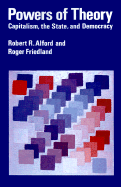Book contents
- Frontmatter
- Contents
- Preface
- Acknowledgments
- Introduction: State and society in theoretical perspective
- 1 Theoretical perspectives as modes of inquiry
- PART I THE PLURALIST PERSPECTIVE
- PART II THE MANAGERIAL PERSPECTIVE
- PART III THE CLASS PERSPECTIVE
- 12 State and society in class perspective
- 13 The capitalist state and accumulation
- 14 The capitalist state and class struggle
- 15 The class perspective on the democratic state
- 16 The class perspective on the bureaucratic state
- PART IV THEORY, POLITICS, AND CONTRADICTIONS IN THE STATE
- Glossary
- Bibliography
- Name index
- Subject index
14 - The capitalist state and class struggle
Published online by Cambridge University Press: 01 June 2011
- Frontmatter
- Contents
- Preface
- Acknowledgments
- Introduction: State and society in theoretical perspective
- 1 Theoretical perspectives as modes of inquiry
- PART I THE PLURALIST PERSPECTIVE
- PART II THE MANAGERIAL PERSPECTIVE
- PART III THE CLASS PERSPECTIVE
- 12 State and society in class perspective
- 13 The capitalist state and accumulation
- 14 The capitalist state and class struggle
- 15 The class perspective on the democratic state
- 16 The class perspective on the bureaucratic state
- PART IV THEORY, POLITICS, AND CONTRADICTIONS IN THE STATE
- Glossary
- Bibliography
- Name index
- Subject index
Summary
Class struggle is the other side of accumulation in the class perspective. In this chapter we summarize several exemplary studies dealing with the sources and consequences of class struggle and the consequences for crises of capitalism.
The debate over the nature of capitalist crisis
For a summary of different class theories of crisis, we rely upon a critique from within the class perspective by Erik Olin Wright (1977). Wright's treatment underlines the fundamental debates within the perspective. Crises are seen as stemming from within the sphere of production, but political and cultural factors explain responses to crisis. As Wright puts it, “all Marxist perspectives on economic crisis tend to see crisis as growing out of the contradictions inherent in the process of capital accumulation.” But there is “very little general consensus on which contradictions are most central to understanding crisis” (p. 195). Capitalist accumulation faces “impediments” that are generated by the process of accumulation itself. Because the process as a whole is contradictory, the solutions to these impediments generate further impediments.
Wright distinguishes four types of impediments to accumulation in Marxist theory: the falling rate of profit, underconsumption, the profit squeeze, and fiscal crises of the state. All of these sources of crisis find their origins in the “contradictions in the sphere of production” (1977, p. 203).
- Type
- Chapter
- Information
- Powers of TheoryCapitalism, the State, and Democracy, pp. 308 - 332Publisher: Cambridge University PressPrint publication year: 1985

